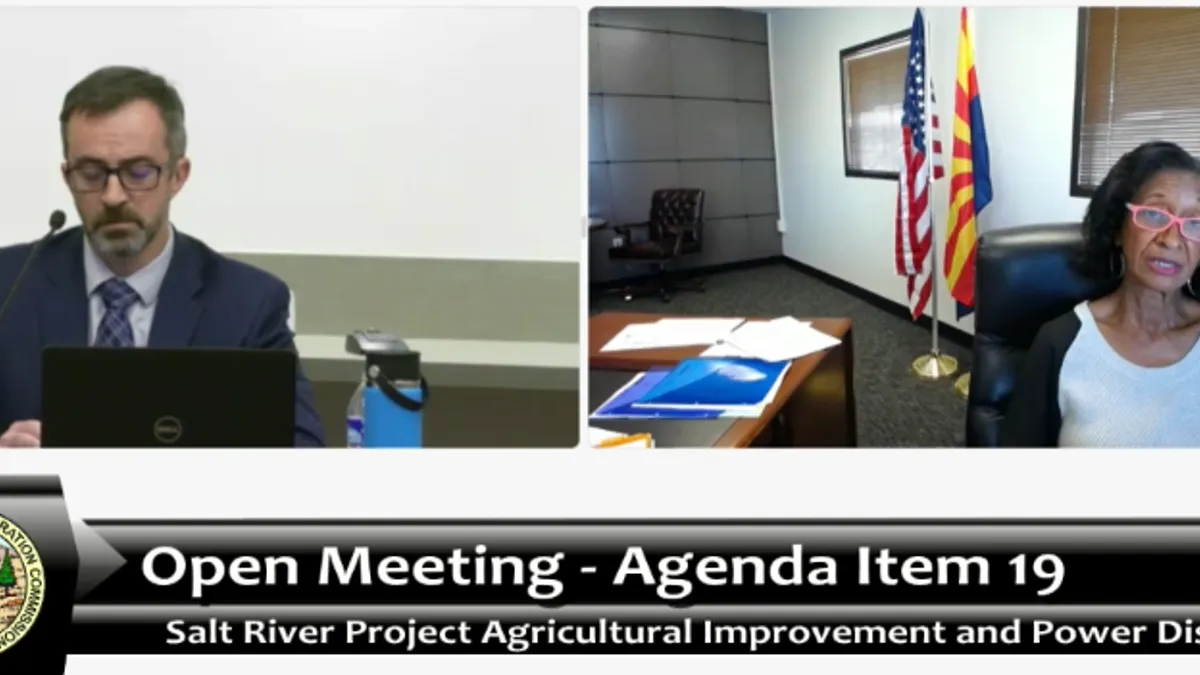Dive Brief:
- Salt River Project's (SRP) plan to install 16 gas turbines, adding an additional 820 MW of power at the Coolidge Generation Station in Arizona, faced pointed criticism on Wednesday as regulators and stakeholders questioned whether the fossil fuel expansion is necessary and if the utility is sufficiently concerned about the project's impact on minority communities.
- The Arizona Corporation Commission (ACC) does not regulate SRP rates, because the utility is designated a quasi-municipality, but will need to approve the power plant expansion due to its size. The commission is expected to vote March 24.
- Environmental justice concerns and charges of energy racism were key issues during Wednesday's oral arguments, as were the lack of a competitive bidding process for the nearly $1 billion project and its potential impacts on rates.
Dive Insight:
SRP's Coolidge plant is located within the city of Coolidge, Arizona, but residents of the nearby historically black community of Randolph live closest to the facility and would be most impacted. And those residents say there has been scant contact from the utility and meager offers of support.
Randolph attorney Diane Post told the commission that SRP offered Randolph residents less support than it did to white communities in similar situations, that the impact on property values would be greater than in neighboring Coolidge, and that noise and light pollution issues had not been sufficiently considered.
"They're already in non-attainment for air pollution, and these cumulative effects will only harm them more," Post said during the hearing. "That is environmental injustice, and environmental racism."
SRP's board approved the expansion in September. The utility did reach out to the local community "at the same time it was going through the approval process with its elected board," SRP attorney Albert Acken, of counsel at Jennings Strouss, told the commission.
The Sierra Club, in a brief, noted that while Randolph residents "complained of little contact with SRP and the negotiations with the neighbors were rushed," the situation was different when the utility expanded its Santan Generating Station in 2001 near the "substantially more affluent" community of Gilbert. There, "sufficient time was allowed to thoroughly address the concerns of residents — concerns that mirrored those of residents in this proceeding."
In the case of the Santan expansion, a final certificate included "numerous conditions agreed upon by community stakeholders to mitigate the plant's visual and noise impacts, as well as address concerns from nearby property owners regarding potentially diminished property values," the Sierra Club noted.
ACC Commissioner Sandra Kennedy, the commission's only African American member, sparred with Acken over the project and SRP's efforts to contact Randolph residents. And she returned repeatedly to the difference in how Gilbert and Randolph residents were treated by SRP.
"I think the disparity that the company has shown in what they've done for Gilbert and Santan is truly over the top, compared to what they have offered a black community who has been there for over 60 years," Kennedy said. "And to shove a project down their throats like this is unconscionable to me.
"I live it every day. I understand what they're going through. I understand their pain. Like no other individual sitting here today. I do understand," Kennedy said.
SRP issued a statement that it "strongly disagrees with some of Commissioner Kennedy’s comments and stands by its efforts to work with the Randolph community, to listen to its community members and to commit financial resources for its future."
The utility said it began outreach to Randolph in August 2021 "with physical mailings, door-to-door interactions, community events, newspaper ads, phone calls and other communications."
The project was announced Aug. 24, 2021, and approved less than a month later.
SRP said it is "fully committed to working with the community in a meaningful way and assist it to prosper."
There are also concerns about the estimated cost of the project, though SRP says it will not impact base rates for six years. The utility is seeing "astronomical" growth and additional power sales will help keep base rates flat, said Acken. Critics, however, are wary.
"No increase in base rates for approximately six years does not speak to SRP customer bill impacts," Diane Brown, executive director of Arizona Public Interest Research Group Education Fund, said in an email.
The Sierra Club also said that SRP's failure to perform a competitive review of potential resources meant "significantly better options" were not considered, including renewables and batteries.
"The evidence clearly and unequivocally shows that the need for adequate, economical and reliable power could be met using clean, renewable resources paired with battery storage, and that this can be accomplished with comparable capital," said Court Rich, senior partner at Rose Law Group, representing the Sierra Club.
Editor's note: We have updated this story to include a statement from SRP.














